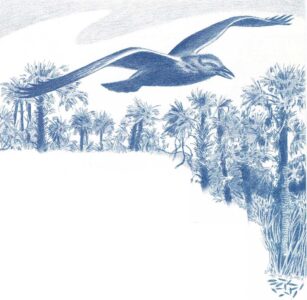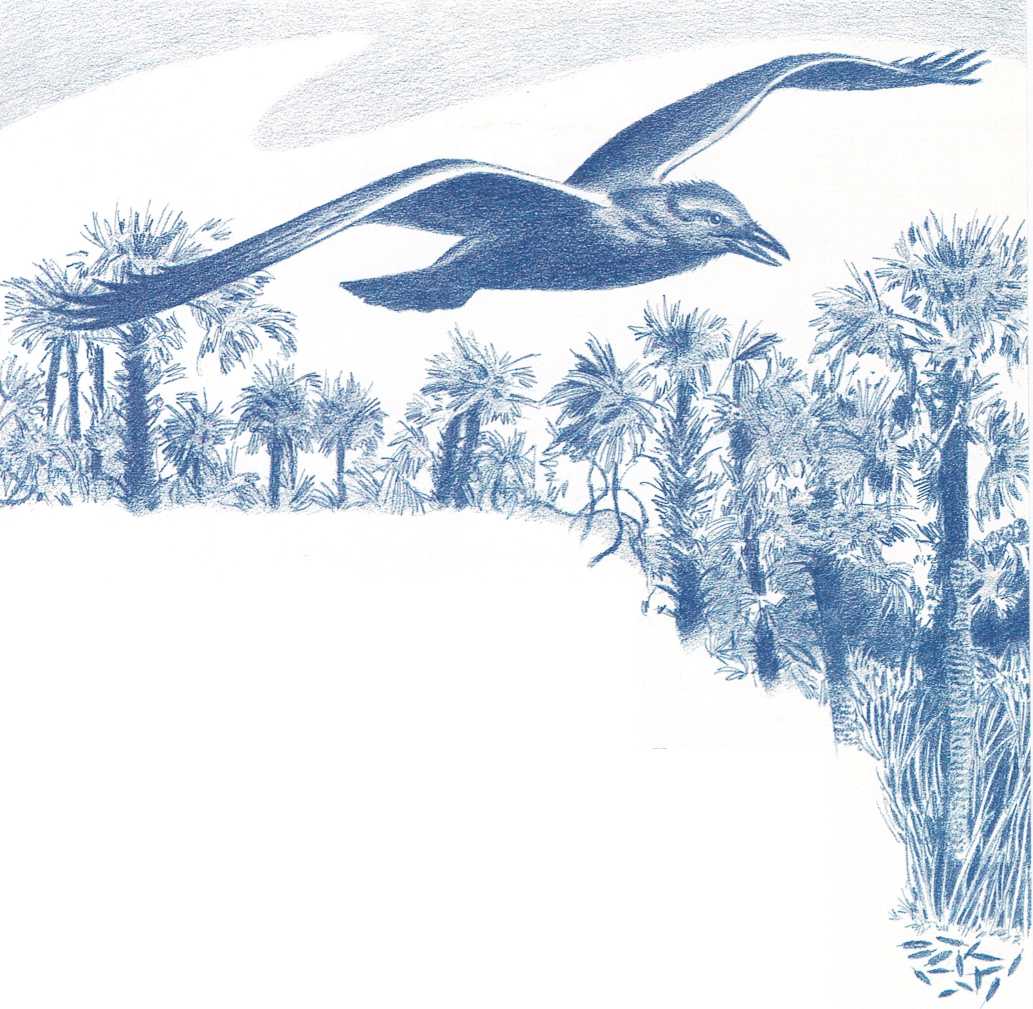
Nina Terrance
from The Cry of the Crow by Jean Craighead George
Mandy Tressel awakes to the sound of gun blasts. Her father or older
brothers, Jack and Carver, must be hunting crows in Piney Woods. Even
Drummer, her younger brother, can hardly wait until he is old enough to
hunt. Later that day, Mandy finds an orphaned baby crow and names her
Nina Terrance. Determined to care for Nina, she makes a hidden nest on
the ground. Somehow, Mandy must keep her father and brothers from
finding her new pet.
Later that afternoon Kray, the leader of the Trumpet Hammock crows, flew
over Piney Woods and, spotting black feathers on the ground, focused
acutely on them by rounding the curvature of his eye lens as crows do.
He dropped down on a tree limb near the skirted sable palm and stared.
Unlike people, who have one central point of sharp vision, birds have
two—one in the center of the retina and one in the rear. These,
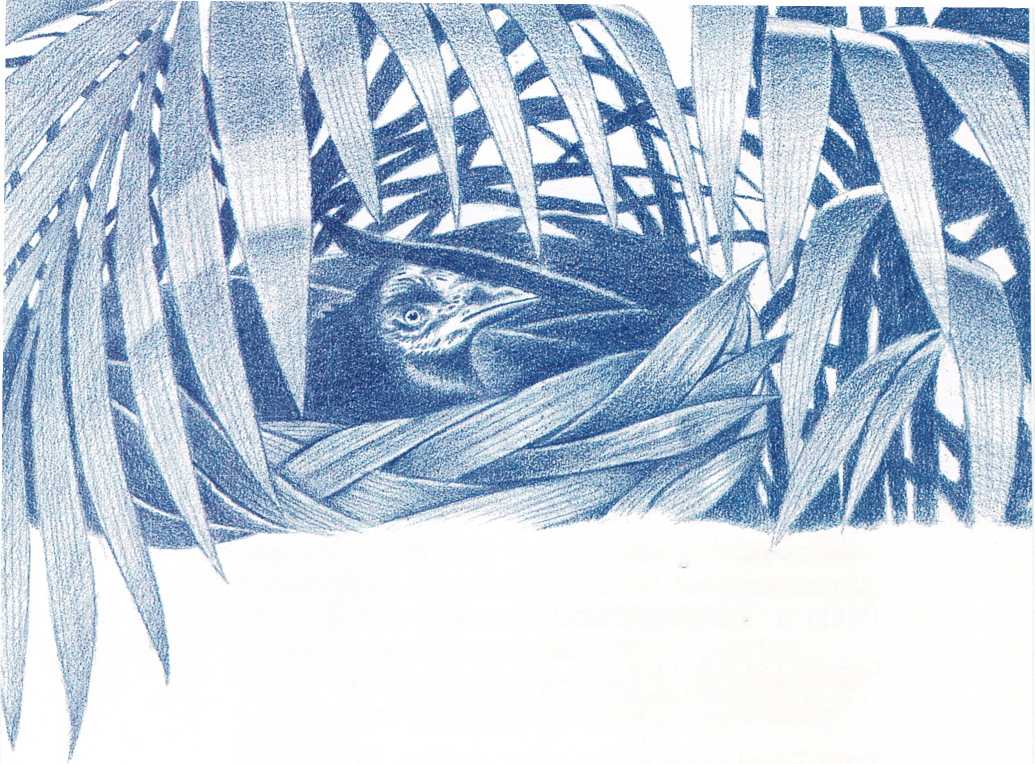
.. together with his overall crow vision, gave Kray three simultaneous
views of the feathers, from each side and forward. What he saw said:
“murdered crow.”“Nevah, nevah,” he mourned. His cry traveled through the forest,
rolled out over the saw grass, and penetrated the dark niches and
hollows of Trumpet Hammock.
At the sound every crow froze where it was. It was as if none existed.
Extensions on stubs appeared, however, black knots on limbs, but no
crows. They had become one with the inanimate things of the forest.
Nina Terrance heard Kray’s doomsday pronouncement and looked at him
through a hole in the leaves. Her stomach pinched with hunger; her legs
wobbled from lack of nourishment. She needed only to cry the begging
note of the eyas crow and Kray, or any other nearby crow, would drop
down and feed the orphan, but she was rendered silent by his “sad crow”
cry.
Still eyeing the black feathers, Kray sidled along the limb, then walked
up a bough like a shadow. When he reached the top of the tree he spread
his wings. A wind gusted under them, lifted him, and carried him
sideways toward the hammock.
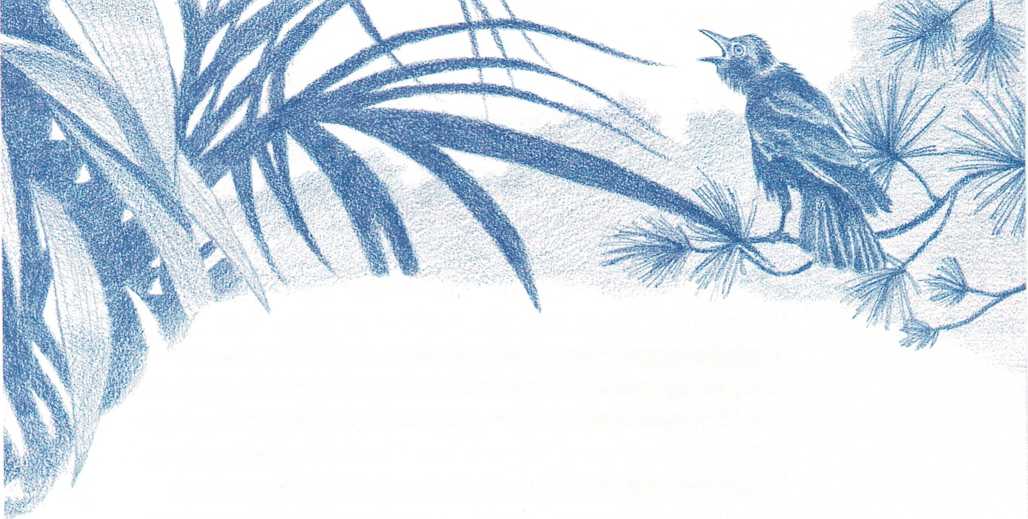
“Nevah, nevah,” he moaned once more, then called sharply, “Caia,” for
crows call “caw” when they are flying away from their roost, “caia” when
they are coming home.
An hour of silence passed, then the birds began to move again.
Nina Terrance turned her head. A beetle crept along the fingerlike edges
of one of the palm leaves that made her nest. She watched it, but she
was still unable to coordinate beak and eye to catch it. She had,
however, today fanned her wings for the first time. Yesterday she had
run her beak across her back feathers. Each day she could do one more
bird skill as she developed toward being a bird that could fly.
When at sunset Kray announced the end of the day with one clear “Caw,”
the eyas shook herself and nestled down in her Mandy-made nest. Her
hunger was unbearable. She closed her eyes and slowed down her breathing
to conserve energy.
Promptly at sunup, when she could see, she flopped to the edge of the
nest and prepared to fling herself to the ground and cry until the crows
of Trumpet Hammock came and fed her.
Crunch da dum. She could not move. The sound of the hunter’s footsteps
immobilized her. Crunch da dum, crunch da dum. Far away now, crunch
da dum.
The sun touched the top of the pines and Kray announced the start of the
day. His clan awoke and yawned, then silently preened their feathers to
make them airtight for flight. The eyases in well-hidden nests opened
their eyes. One was old enough to shake himself, three days more
advanced than Nina Terrance.
Presently an adult crow designated himself guard crow for the morning,
for the crows rotate this duty. He sailed to a stub on an old cypress
tree, where he scanned the river of grass, the distant highway, Waterway
Village, and the strawberry field. The berries matured later than most
of Florida’s strawberry crop, for they were a unique cross between a
wild strawberry of the north and the enormous cultivated berries of
Florida and California. Their flavor was piquant and sugar sweet, and
they were very much in demand in fancy restaurants. The guard crow did
not even glance at them. The “sad crow” call of yesterday had linked
death to the woods.
The door of the cinder-block house opened and Mandy came out. The guard
crow knew her as he did her mother. He considered them both harmless
“large rabbits” of the yard and paths and was unafraid of them.
“Caaa caa ca,” he called to the clan—a signal that meant disperse and
go hunt. One by one the crows flapped through the trees and coasted on
partially extended wings out across the Glades, then beat their way
toward the distant highway where they scouted for road kill. The guard
bird watched them go, flattening his eye lens to keep them in focus
three and four miles away. Then he glanced out of the back of his eyes
and scanned for enemies: snakes, rats, owls, hawks, anything that might
threaten the precious eyases.
When the crows were gone, the mockingbirds and wrens flew to their
singing posts and announced ownership of their part of the forest edge.
Nina Terrance was listening to them when she felt Mandy push back the
huge leaves and enter the sable palm tent.
“Hi, Nina Terrance,” she said. “I can’t stay long. I sneaked out of the
house before Daddy got up, to feed you and to make sure you’re all
right.” Cupping her hands, she lifted Nina out of her nest and placed
her on the ground. Dipping a piece of cheese sandwich in a jar of milk,
she held it out for Nina Terrance. The bird instantly recognized the
offering as food although she had never seen bread and cheese before.
She fluttered her wings and begged. Mandy stuffed her mouth and broke
off another bite.
As Nina Terrance ate she changed the shape of her eye lenses from flat
to round and back again. Then she blinked. Something was happening to
her mind. Mandy was becoming her mother and she, Nina Terrance, was
becoming Mandy. Her feathers in her bird mind were knitting into human
clothing, her head was becoming covered with brown hair, and her wings
were feeling like hands.
Mandy was being imprinted on her mind, because whoever feeds a baby bird
is stamped upon its brain as a parent, be it a mechanical toy bird or a
little girl. The bird thereafter considers itself to be like the toy or
the human.

By the end of the feeding Nina Terrance was looking with adoration at
her mother, whom she now thought she resembled. Her mother picked her
up, held her close, and after smelling her sweet feathers put her in the
nest.
“Stay still until I come back,” she said.
“Ay,” croaked Nina Terrance, fluttering her throat to effect an
imitation of her mother’s voice.
When Mandy reached home her father was at his desk in the living room
making notes in his account book. He struggled, head down, shoulders
rounded over the work, for Fred Tressel had never completed sixth grade
and arithmetic came hard to him. He was only comfortable when he was out
in the greenhouse or field crossbreeding his famous stock of
strawberries and, when a good strain came along, an occasional tomato or
pepper. Mandy’s mother, Barbara, often said Fred Tressel was related to
the pollinating bee.
Mandy paused on a dark step to watch this huge man who had grown up
planting vegetables and

fruits—and also hunting alligators until they were protected by the
National Park. When he smiled, which was most of the time, he did not
seem like a person who could shoot crows. Once Mandy had asked him why
he did it, and he had answered: “My family comes first. Our crops are
our living.”
This had not been a very satisfactory answer for Mandy because, one, she
had never seen a crow in the strawberry patch, and two, crows were small
and helpless like Nina Terrance.
She must ask him again, she thought as she crawled back into bed with
her clothes on and waited until she heard her father fixing his
breakfast in the kitchen below.
The clank of pans was her usual signal to get up. She arose, brushed her
hair, and listened as she did every morning to Jack and Carver shouting
in the shower and banging doors. In the cacophony of morning in the
Tressel home she ran down the stairs and hurried through the living room
and across the hall to her parents’ room.
Her mother was seated at her dressing table brushing her short brown
hair and coaxing the front curls into waves.
“Hi, honey,” she said upon seeing Mandy in the mirror. “You look like
you’ve swallowed an alligator. What’s up?”
The door banged as her father went out to the strawberry field. Mandy
sat down on the bed and patted the green slacks and shirt her mother had
laid out for herself. She worked weekdays at the Agricultural Experiment
Station at the north end of town.
“I have a new friend,” she said.
“That’s wonderful. What’s her name?” Her mother peered closer at herself
and rubbed a freckle on her cheek.

“Nina Terrance.”
“That’s an interesting name. Is she Puerto Rican?” “No.”
“Too bad, I hoped maybe she could help me. Maria and Teresa will be
helping with the strawberry crop again and I can’t always understand
them.”
“You speak good Spanish, Mommy,” said Mandy, smoothing the collar of the
shirt on the bed.
“Well, I’m learning, but I could use help. And I hoped your new friend
…”
“Nina Terrance can’t possibly help,” Mandy said so forcibly that Barbara
looked again at her daughter’s reflection in the mirror.
“I just wondered if she could, that’s all. What color is your friend’s
hair?”
“Black.”
“And her eyes?”
“A pale milky blue.”
“Pale milky blue? Good heavens, Mandy, she sounds odd.” Barbara Tressel
slowly swung around on her stool and peered at her daughter. “What do
her parents do?” she asked suspiciously.
\’ “Fly.”
“They do? Where does she live?”
“In Piney Woods.”
“Oh, Mandy. Are you sure you should keep this friend?” Mandy slid off
the bed and walked to her mother’s side.
“Yes, Mommy. I am.”
“You know how your dad feels about crows?” She looked directly into
Mandy’s eyes. “I mean how he really feels about them.”
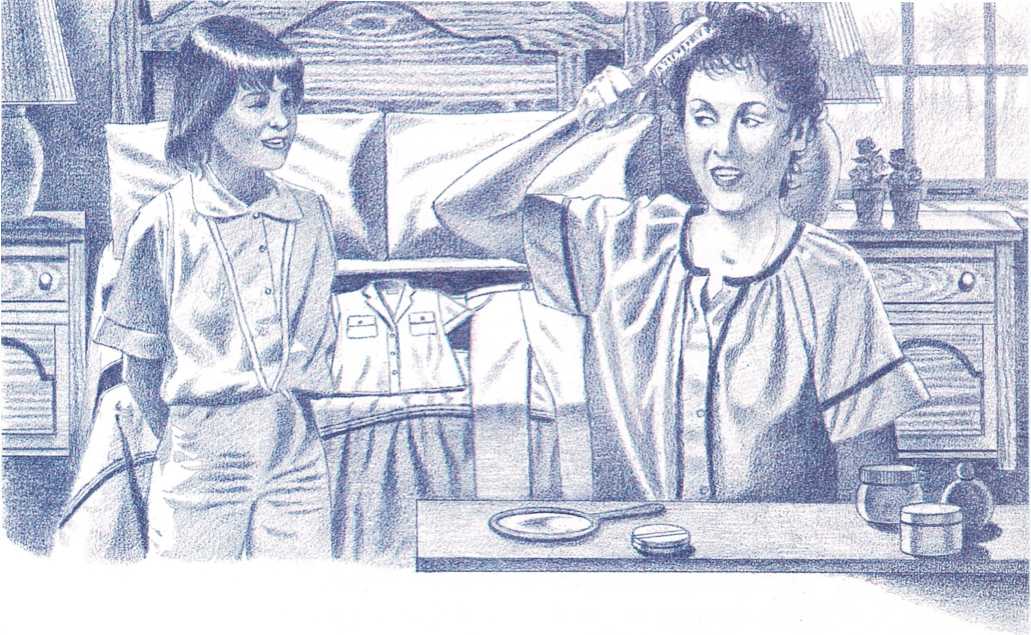
“Yes.”
“And you think you should go ahead with this?”
“I’ll keep her out of his sight in the woods.”
Barbara slowly brushed her hair.
“Where are her parents?”
“Dead. All the crows of Piney Woods are dead. Daddy and Jack and Carver
shot them all—all but Nina Terrance.”
Barbara winced.
“I think you ought to talk to your father about this. He might not be as
terrible as you think.”
“But he is. He shoots crows.”
“He also knows a lot about crows and might be able to help you. He says
crows are vindictive and remember forever the persons who shoot at them.
You wouldn’t want that crow hurting Daddy or Jack or Carver, would you?”
Mandy did not answer.
“Maybe your dad knows how to erase an imprint of a killer in a crow’s
mind. Then it wouldn’t hurt anyone.”
“How could a crow possibly hurt anyone? Nina Terrance is small and
gentle.”
Barbara shrugged and changed the subject.
“Have you written any more stories?”
Mandy was about to say no, then changed her mind.
“One. For The Waterway Times.\”
“Good. Are they going to run it?”
“No.”
“Shoot,” said Barbara with feeling. “Older brothers sure can be
difficult. I had three.”
Mandy’s head drooped, and she took her mother’s hand.
“Why won’t they let me be part of the newspaper? Drummer is and he’s
just a little boy.”
“I don’t know, Mandy. I really don’t know.” She ran her fingers through
Mandy’s hair. “But I think it is something about practicing being
dominant so they can compete out in the world. Soon Jack and Carver will
have to seek their fortunes, so to speak.”
“I do want to be a reporter for them. They have such a good time working
together on that paper.”
“Never mind, Mandy. You’re wonderful.”
“I’m not. I’m lonely. Loners don’t grow and learn. I’ll stay dumb.” She
slipped her arm around her mother and buried her face in her breast.
Barbara hugged her.
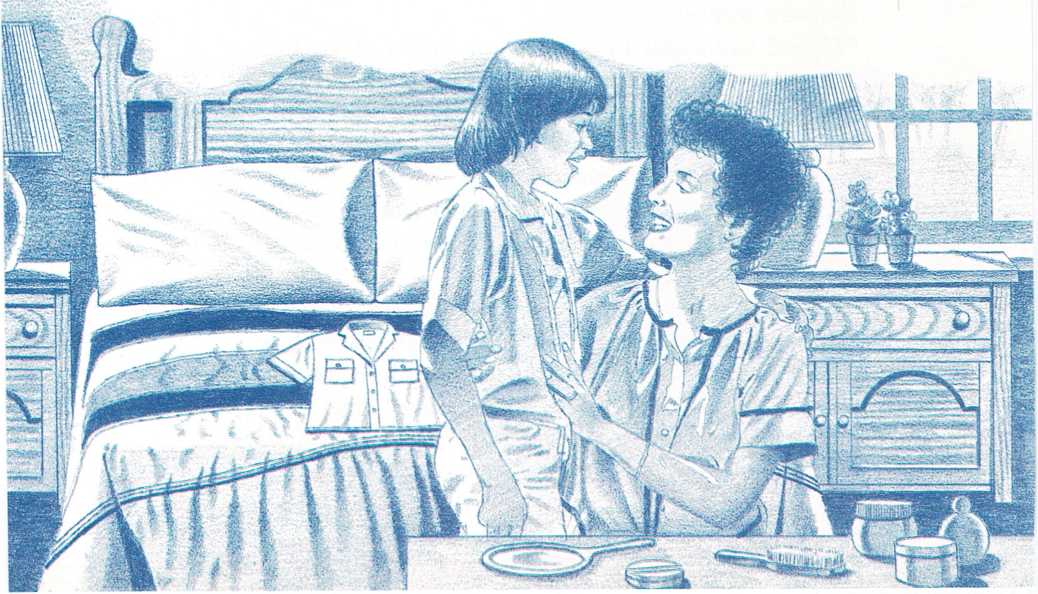
“But you have a remarkable friend now in Nina Terrance.”
Mandy blinked back her tears and smiled up at her mother.
“Nina Terrance attends a private school,” said Mandy.
“Wow, she must be rich.”
“Very rich. She has a favorite charity.”
“She does?” Barbara knitted her brow trying to figure out where the game
was leading.
“Yes, a poor family on the other side of Piney Woods.”
“Oh, I see,” Barbara nodded. “We must pack food boxes for them.”
“Exactly,” said Mandy, clapping her hands in the excitement of their
fantasy world. “And she can’t visit me. Her parents are very
protective.”
“Of course,” Barbara squeezed Mandy’s hand. “I would never have thought
of that.”
“I met her in the dentist’s office. She has braces too.”
“That’s getting pretty complicated. Do you have to have met her in the
dentist’s office?”
“I’ve already told Drummer I did.”
“Well, we had better stick with that. What else did you tell him about
her?”
“That’s all.” Mandy threw herself back on the bed again. “Except that
she’s rich and has a charity.”
“Good.” Barbara became silent as if weighing the wisdom of Mandy’s
keeping the crow.
“How can I tell which is the alarm cry?” Mandy had sensed her change of
heart and was trying to get her more involved. It worked.
“Watch old Kray, the boss bird that Drummer named,” Barbara said. “I
don’t know which one he is, but your daddy says when he or Jack or
Carver come near Trumpet Hammock, he gives the alarm cry and all his
clan vanishes from sight.”
“Does he give it when we come out?”
“No. He knows they hunt and kill crows and we don’t.” Barbara was
smiling helplessly at her daughter. “Mandy, I’m such a sucker for this.
Shall we pack a nice charity box for Nina Terrance’s poor family?”
“You’re going to play,” Mandy exclaimed happily. “Oh, Mommy, you’re
going to love Nina Terrance.”
“Yes, I’m afraid I am. Crows are fascinating, but you’ll have to keep
this one away from the farm.”
“I can do it.”
“Well, baby crows like to follow the parent that feeds them. You’ll have
to be clever. Doctor Bert, at the Experiment Station, is an expert on
crows, too. I’ll ask him what to do today and bring you some of the
bulletins he writes about their behavior and food habits. Crows are
social birds—that is, they live and work together like we people do.
They are very intelligent, too. Your dad says they can even count. If
three hunters go into a woods where a roost is, and two of them leave,
the crows won’t appear until the third hunter departs.”
“Daddy would want me to play with an intelligent friend, wouldn’t he?”
Barbara laughed and buttoned her shirt. “He certainly would.”
Mandy soon learns how clever her pet is—and how much trouble, too.
Read The Cry of the Crow to find out more about Nina Terrance and the
problems she creates. The author, Jean Craighead George, has written
many books about nature and wildlife, such as My Side of the Mountain
and Julie of the Wolves, which won the Newbery Medal.


